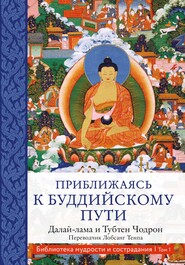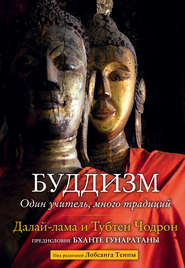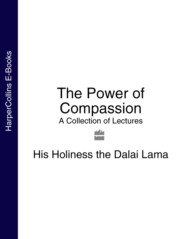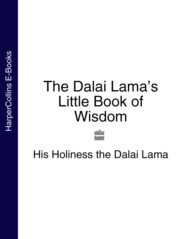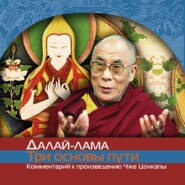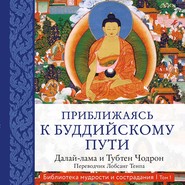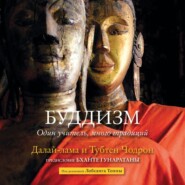По всем вопросам обращайтесь на: info@litportal.ru
(©) 2003-2024.
✖
The Four Noble Truths
Автор
Год написания книги
2018
Настройки чтения
Размер шрифта
Высота строк
Поля
The Four Noble Truths
Литагент HarperCollins
This book contains the essential guide to some of the central Buddhist teachings based on the recent UK lectures by his holiness.This volume includes:-‘The Four Noble truths’, one of the most central tenets of Tibetan Buddhism.The need to balance spiritual and material values.‘Compassion, the Basis for Human Happiness’
THE FOUR
NOBLE TRUTHS
Fundamentals of the Buddhist Teachings
His Holiness the XIV Dalai Lama
translated by Geshe Thupten Jinpa edited by Dominique Side
CONTENTS
Title Page (#u1c44dbdf-77b0-50f4-ad86-e07540e933ad)
Preface by Kesang Y Takla (#u668e3d66-ec8b-5591-b9af-e8c34b0bb27f)
Introduction (#uf72630bd-166a-5360-a4c1-eb122d89bb08)
1 Introducing The Four Noble Truths (#u75f4b5b4-2664-5c6f-bc08-11dc3a99d57f)
2 The Truth of Suffering (#litres_trial_promo)
3 The Truth of The Origin of Suffering (#litres_trial_promo)
4 The Truth of Cessation (#litres_trial_promo)
5 The Truth of The Path (#litres_trial_promo)
Appendix: Compassion, The Basis for Human Happiness (#litres_trial_promo)
Glossary (#litres_trial_promo)
Recommended Reading (#litres_trial_promo)
About the Author (#litres_trial_promo)
Notes (#litres_trial_promo)
Copyright (#litres_trial_promo)
About the Publisher (#litres_trial_promo)
PREFACE (#ulink_e423cd91-439e-593d-95ea-7a64558f6e3c)
In July 1996, His Holiness the Dalai Lama gave a series of lectures on Buddhist thought and practice at the Barbican Centre in London. These talks were facilitated by the Network of Buddhist Organisations in U.K. – a national association of Buddhist Centres.
The central theme of His Holiness the Dalai Lama’s lectures at the Barbican Centre, which form the core of this book, is the Buddhist teaching on the principle of the Four Noble Truths, which is the foundation of all Buddha’s teachings. In these talks, His Holiness presents a comprehensive explanation of the subject, helping us to gain a better understanding of the Four Noble Truths.
The appendix, ‘Compassion – the Basis for Human Happiness’, is the text of a general public talk by His Holiness at the Free Trade Centre in Manchester. This was organized by the Tibet Society of U.K. – which is one of the oldest Tibetan Support organizations. This chapter on compassion complements the teachings on the Four Noble Truths beautifully as it illustrates how the teachings of the Buddha can be applied in our day-to-day life.
As His Holiness the Dalai Lama’s central message in these talks is compassion and the teachings on how to live a life of human kindness, it is our hope that this book will be of interest and benefit to people of all faiths and also those who do not share in any religious faiths.
The Office of Tibet in London would like to thank Cait Collins and Jane Rasch for transcribing the tapes of the talks, and Dominique Side and the translator Geshe Thupten Jinpa for editing the manuscript for publication.
Kesang Y. Takla (Mrs)Representative of H. H. the Dalai LamaLondon
INTRODUCTION (#ulink_d6b32f51-249e-52c0-9a3b-72e055880531)
The Four Noble Truths are the very foundation of the Buddhist teaching, and that is why they are so important. In fact, if you don’t understand the Four Noble Truths, and if you have not experienced the truth of this teaching personally, it is impossible to practise Buddha Dharma. Therefore I am always very happy to have the opportunity to explain them.
Generally speaking, I believe that all the major world religions have the potential to serve humanity and develop good human beings. By ‘good’ or ‘nice’, I don’t mean that people look good; I mean that they have a good and more compassionate heart. This is why I always say that it is better to follow one’s own traditional religion, because by changing religion you may eventually find emotional or intellectual difficulties. For example, here in England the traditional religious culture is Christian, so it may be better for you to follow that.
However, for those of you who really feel that your traditional religion is not effective for you, and for those who are radical atheists, then the Buddhist way of explaining things may hold some attraction. Maybe in this case it is all right to follow Buddhism – generally, I think it is better to have some kind of religious training than none at all. If you really feel attracted to the Buddhist approach, and the Buddhist way of training the mind, it is very important to reflect carefully, and only when you feel it is really suitable for you is it right to adopt Buddhism as your personal religion.
There is another very important point here. Human nature is such that sometimes, in order to justify our adoption of a new religion, we may criticize our previous religion, or our country’s traditional religion, and claim it is inadequate. This should not happen. Firstly, although your previous religion may not be effective for you, that does not mean it will completely fail to be of value to millions of other people. Since we should respect all human beings, we must also respect those who are following different religious paths. Furthermore, your previous religion – like all religions – does have the potential to help certain types of people. It is clear that for some people the Christian approach is more effective than the Buddhist one. It depends on the individual’s mental disposition. We must therefore appreciate that potential in each religion, and respect all those who follow them.
The second reason is that we are now becoming aware of the many religious traditions of the world, and people are trying to promote genuine harmony between them. One example of this is the interfaith gathering in Assisi in 1986
(#litres_trial_promo) on religions and the environment. I think there are now many interfaith circles and the idea of religious pluralism is taking root. This is a very encouraging sign. At such a time, when people are promoting genuine religious understanding in many areas, a single individual’s criticism can be very harmful. So on these grounds, we should maintain a spirit of respect for other religions.
I wanted to begin with these points, because when I actually explain the Four Noble Truths, I have to argue the Buddhist way is the best! Also, if you were to ask me what the best religion is for me personally, my answer would be Buddhism, without any hesitation. But that does not mean that Buddhism is best for everyone – certainly not. Therefore, during the course of my explanation, when I say that I feel that the Buddhist way is best, you should not misunderstand me.
I would like to further emphasize that when I say that all religions have great potential, I am not just being polite or diplomatic. Whether we like it or not, the entire human race cannot be Buddhist, that is quite clear. Similarly, the whole of humanity cannot be Christian, or Muslim, either. Even in India during the Buddha’s time, the entire population did not turn to Buddhism. This is just a fact. Furthermore, I have not just read books about other religions but I have met genuine practitioners from other traditions. We have talked about deep, spiritual experiences, in particular the experience of loving kindness. I have noticed a genuine and very forceful loving kindness in their minds. My conclusion therefore is that these various religions have the potential to develop a good heart.
Whether or not we like the philosophy of other religions isn’t really the point. For a non-Buddhist, the idea of nirvana and a next life seems nonsensical. Similarly, to Buddhists the idea of a Creator God sometimes sounds like nonsense. But these things don’t matter; we can drop them. The point is that through these different traditions, a very negative person can be transformed into a good person. That is the purpose of religion – and that is the actual result. This alone is a sufficient reason to respect other religions.
There is one last point. As you may know, Buddha taught in different ways, and Buddhism has a variety of philosophical systems such as Vaibhashika, Sautrantika, Chittamatra and Madhyamaka. Each one of these schools quotes the word of the Buddha from the Sutras. If the Buddha taught in these different ways, it would seem that he himself was not very sure about how things really are! But this is not actually the case; the Buddha knew the different mental dispositions of his followers. The main purpose of teaching religion is to help people, not to become famous, so he taught what was suitable according to the disposition of his listeners. So even Buddha Shakyamuni very much respected the views and rights of individuals. A teaching may be very profound but if it does not suit a particular person, what is the use of explaining it? In this sense, the Dharma is like medicine. The main value of medicine is that it cures illness; it is not just a question of price. For example, one medicine may be very precious and expensive, but if it is not appropriate for the patient, then it is of no use.
Since there are different types of people in the world, we need different types of religion. Let me give you one example of this. At the beginning of the 70s, an Indian engineer showed a keen interest in Buddhism and eventually became a monk. He was very sincere and a very nice person. Then one day I explained to him the Buddhist theory of anatman, the theory of no-self or no-soul,
(#litres_trial_promo) and he was so frightened by it he was shaking all over. If there really was no permanent soul, then he felt there was something very fundamental missing. He was literally shivering all over. I found it very difficult to explain the meaning of anatman to him; it took months. Eventually his shivering grew less and less. So for such a person, it is better to practise a teaching that is based on atman, or a belief in the soul.
If we are aware of all these points, then it is very easy to respect and appreciate the value of traditions other than our own.
BASIC PRINCIPLES OF BUDDHISM
Whenever I introduce the Buddhist teachings, I make a point of presenting them in terms of two basic principles. The first of these is the interdependent nature of reality.
(#litres_trial_promo) All Buddhist philosophy rests on an understanding of this basic truth. The second principle is that of non-violence, which is the action taken by a Buddhist practitioner who has the view of the interdependent nature of reality. Non-violence essentially means that we should do our best to help others and, if this is not possible, should at the very least refrain from harming them. Before I explain the Four Noble Truths in detail, I propose to outline both these principles by way of background.
Taking Refuge and Generating Bodhichitta
First, I will introduce these principles in traditional Buddhist terms. Technically, we become a Buddhist when we decide to take Refuge in the Three Jewels, and when we generate bodhichitta, which is known as compassion, the altruistic mind, or our good heart. The Three Jewels of Buddhism are the Buddha; the Dharma, his teaching; and the Sangha or community of practitioners. It is very clear that the idea of helping others lies at the heart of both Refuge and Bodhichitta. The practice of Generating Bodhichitta explicitly entails committing oneself to activities which are primarily aimed at helping others; while the practice of Taking Refuge lays the foundation for the practitioner to lead his or her life in an ethically disciplined way, avoiding actions that are harmful to others and respecting the laws of karma.
Unless we have a good foundational experience of the practice of Taking Refuge in the Three Jewels, we will not be able to have a high level of realization of bodhichitta. It is for this reason that the distinction between a practising Buddhist and a non-Buddhist is made on the basis of whether or not an individual has taken Refuge in the Three Jewels.
Литагент HarperCollins
This book contains the essential guide to some of the central Buddhist teachings based on the recent UK lectures by his holiness.This volume includes:-‘The Four Noble truths’, one of the most central tenets of Tibetan Buddhism.The need to balance spiritual and material values.‘Compassion, the Basis for Human Happiness’
THE FOUR
NOBLE TRUTHS
Fundamentals of the Buddhist Teachings
His Holiness the XIV Dalai Lama
translated by Geshe Thupten Jinpa edited by Dominique Side
CONTENTS
Title Page (#u1c44dbdf-77b0-50f4-ad86-e07540e933ad)
Preface by Kesang Y Takla (#u668e3d66-ec8b-5591-b9af-e8c34b0bb27f)
Introduction (#uf72630bd-166a-5360-a4c1-eb122d89bb08)
1 Introducing The Four Noble Truths (#u75f4b5b4-2664-5c6f-bc08-11dc3a99d57f)
2 The Truth of Suffering (#litres_trial_promo)
3 The Truth of The Origin of Suffering (#litres_trial_promo)
4 The Truth of Cessation (#litres_trial_promo)
5 The Truth of The Path (#litres_trial_promo)
Appendix: Compassion, The Basis for Human Happiness (#litres_trial_promo)
Glossary (#litres_trial_promo)
Recommended Reading (#litres_trial_promo)
About the Author (#litres_trial_promo)
Notes (#litres_trial_promo)
Copyright (#litres_trial_promo)
About the Publisher (#litres_trial_promo)
PREFACE (#ulink_e423cd91-439e-593d-95ea-7a64558f6e3c)
In July 1996, His Holiness the Dalai Lama gave a series of lectures on Buddhist thought and practice at the Barbican Centre in London. These talks were facilitated by the Network of Buddhist Organisations in U.K. – a national association of Buddhist Centres.
The central theme of His Holiness the Dalai Lama’s lectures at the Barbican Centre, which form the core of this book, is the Buddhist teaching on the principle of the Four Noble Truths, which is the foundation of all Buddha’s teachings. In these talks, His Holiness presents a comprehensive explanation of the subject, helping us to gain a better understanding of the Four Noble Truths.
The appendix, ‘Compassion – the Basis for Human Happiness’, is the text of a general public talk by His Holiness at the Free Trade Centre in Manchester. This was organized by the Tibet Society of U.K. – which is one of the oldest Tibetan Support organizations. This chapter on compassion complements the teachings on the Four Noble Truths beautifully as it illustrates how the teachings of the Buddha can be applied in our day-to-day life.
As His Holiness the Dalai Lama’s central message in these talks is compassion and the teachings on how to live a life of human kindness, it is our hope that this book will be of interest and benefit to people of all faiths and also those who do not share in any religious faiths.
The Office of Tibet in London would like to thank Cait Collins and Jane Rasch for transcribing the tapes of the talks, and Dominique Side and the translator Geshe Thupten Jinpa for editing the manuscript for publication.
Kesang Y. Takla (Mrs)Representative of H. H. the Dalai LamaLondon
INTRODUCTION (#ulink_d6b32f51-249e-52c0-9a3b-72e055880531)
The Four Noble Truths are the very foundation of the Buddhist teaching, and that is why they are so important. In fact, if you don’t understand the Four Noble Truths, and if you have not experienced the truth of this teaching personally, it is impossible to practise Buddha Dharma. Therefore I am always very happy to have the opportunity to explain them.
Generally speaking, I believe that all the major world religions have the potential to serve humanity and develop good human beings. By ‘good’ or ‘nice’, I don’t mean that people look good; I mean that they have a good and more compassionate heart. This is why I always say that it is better to follow one’s own traditional religion, because by changing religion you may eventually find emotional or intellectual difficulties. For example, here in England the traditional religious culture is Christian, so it may be better for you to follow that.
However, for those of you who really feel that your traditional religion is not effective for you, and for those who are radical atheists, then the Buddhist way of explaining things may hold some attraction. Maybe in this case it is all right to follow Buddhism – generally, I think it is better to have some kind of religious training than none at all. If you really feel attracted to the Buddhist approach, and the Buddhist way of training the mind, it is very important to reflect carefully, and only when you feel it is really suitable for you is it right to adopt Buddhism as your personal religion.
There is another very important point here. Human nature is such that sometimes, in order to justify our adoption of a new religion, we may criticize our previous religion, or our country’s traditional religion, and claim it is inadequate. This should not happen. Firstly, although your previous religion may not be effective for you, that does not mean it will completely fail to be of value to millions of other people. Since we should respect all human beings, we must also respect those who are following different religious paths. Furthermore, your previous religion – like all religions – does have the potential to help certain types of people. It is clear that for some people the Christian approach is more effective than the Buddhist one. It depends on the individual’s mental disposition. We must therefore appreciate that potential in each religion, and respect all those who follow them.
The second reason is that we are now becoming aware of the many religious traditions of the world, and people are trying to promote genuine harmony between them. One example of this is the interfaith gathering in Assisi in 1986
(#litres_trial_promo) on religions and the environment. I think there are now many interfaith circles and the idea of religious pluralism is taking root. This is a very encouraging sign. At such a time, when people are promoting genuine religious understanding in many areas, a single individual’s criticism can be very harmful. So on these grounds, we should maintain a spirit of respect for other religions.
I wanted to begin with these points, because when I actually explain the Four Noble Truths, I have to argue the Buddhist way is the best! Also, if you were to ask me what the best religion is for me personally, my answer would be Buddhism, without any hesitation. But that does not mean that Buddhism is best for everyone – certainly not. Therefore, during the course of my explanation, when I say that I feel that the Buddhist way is best, you should not misunderstand me.
I would like to further emphasize that when I say that all religions have great potential, I am not just being polite or diplomatic. Whether we like it or not, the entire human race cannot be Buddhist, that is quite clear. Similarly, the whole of humanity cannot be Christian, or Muslim, either. Even in India during the Buddha’s time, the entire population did not turn to Buddhism. This is just a fact. Furthermore, I have not just read books about other religions but I have met genuine practitioners from other traditions. We have talked about deep, spiritual experiences, in particular the experience of loving kindness. I have noticed a genuine and very forceful loving kindness in their minds. My conclusion therefore is that these various religions have the potential to develop a good heart.
Whether or not we like the philosophy of other religions isn’t really the point. For a non-Buddhist, the idea of nirvana and a next life seems nonsensical. Similarly, to Buddhists the idea of a Creator God sometimes sounds like nonsense. But these things don’t matter; we can drop them. The point is that through these different traditions, a very negative person can be transformed into a good person. That is the purpose of religion – and that is the actual result. This alone is a sufficient reason to respect other religions.
There is one last point. As you may know, Buddha taught in different ways, and Buddhism has a variety of philosophical systems such as Vaibhashika, Sautrantika, Chittamatra and Madhyamaka. Each one of these schools quotes the word of the Buddha from the Sutras. If the Buddha taught in these different ways, it would seem that he himself was not very sure about how things really are! But this is not actually the case; the Buddha knew the different mental dispositions of his followers. The main purpose of teaching religion is to help people, not to become famous, so he taught what was suitable according to the disposition of his listeners. So even Buddha Shakyamuni very much respected the views and rights of individuals. A teaching may be very profound but if it does not suit a particular person, what is the use of explaining it? In this sense, the Dharma is like medicine. The main value of medicine is that it cures illness; it is not just a question of price. For example, one medicine may be very precious and expensive, but if it is not appropriate for the patient, then it is of no use.
Since there are different types of people in the world, we need different types of religion. Let me give you one example of this. At the beginning of the 70s, an Indian engineer showed a keen interest in Buddhism and eventually became a monk. He was very sincere and a very nice person. Then one day I explained to him the Buddhist theory of anatman, the theory of no-self or no-soul,
(#litres_trial_promo) and he was so frightened by it he was shaking all over. If there really was no permanent soul, then he felt there was something very fundamental missing. He was literally shivering all over. I found it very difficult to explain the meaning of anatman to him; it took months. Eventually his shivering grew less and less. So for such a person, it is better to practise a teaching that is based on atman, or a belief in the soul.
If we are aware of all these points, then it is very easy to respect and appreciate the value of traditions other than our own.
BASIC PRINCIPLES OF BUDDHISM
Whenever I introduce the Buddhist teachings, I make a point of presenting them in terms of two basic principles. The first of these is the interdependent nature of reality.
(#litres_trial_promo) All Buddhist philosophy rests on an understanding of this basic truth. The second principle is that of non-violence, which is the action taken by a Buddhist practitioner who has the view of the interdependent nature of reality. Non-violence essentially means that we should do our best to help others and, if this is not possible, should at the very least refrain from harming them. Before I explain the Four Noble Truths in detail, I propose to outline both these principles by way of background.
Taking Refuge and Generating Bodhichitta
First, I will introduce these principles in traditional Buddhist terms. Technically, we become a Buddhist when we decide to take Refuge in the Three Jewels, and when we generate bodhichitta, which is known as compassion, the altruistic mind, or our good heart. The Three Jewels of Buddhism are the Buddha; the Dharma, his teaching; and the Sangha or community of practitioners. It is very clear that the idea of helping others lies at the heart of both Refuge and Bodhichitta. The practice of Generating Bodhichitta explicitly entails committing oneself to activities which are primarily aimed at helping others; while the practice of Taking Refuge lays the foundation for the practitioner to lead his or her life in an ethically disciplined way, avoiding actions that are harmful to others and respecting the laws of karma.
Unless we have a good foundational experience of the practice of Taking Refuge in the Three Jewels, we will not be able to have a high level of realization of bodhichitta. It is for this reason that the distinction between a practising Buddhist and a non-Buddhist is made on the basis of whether or not an individual has taken Refuge in the Three Jewels.







